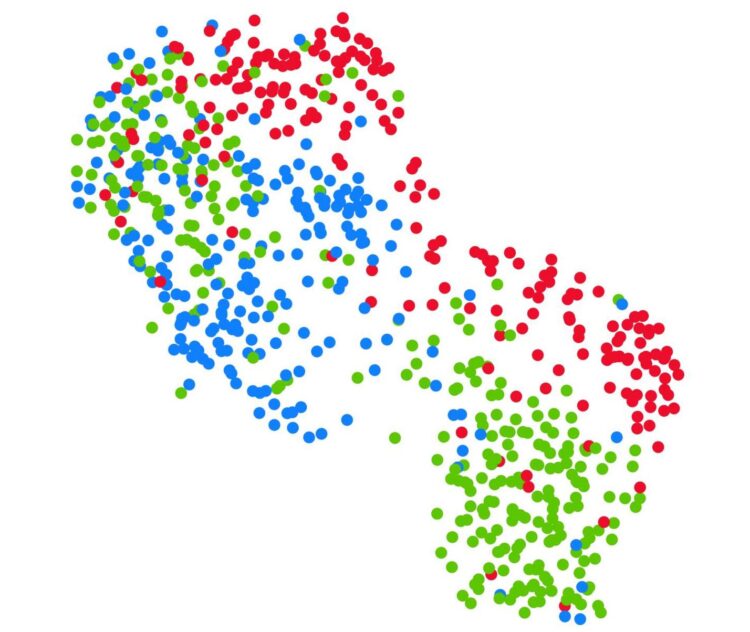Elucidating how the production of antibodies is regulated, one cell at a time

Each circle represents a different cell. Different colors are cells with different characteristics. The proximity between the circles represents similarity between the genes that these cells are using. This figure shows that the cells divide into two large groups: the most mature (on the bottom right) and the most immature (on the left side)
Credit: Saumya Kumar (iMM)
A study coordinated by Luís Graça, principal investigator at the Instituto de Medicina Molecular João Lobo Antunes (iMM; Portugal) and Professor at the Faculty of Medicine of the University of Lisbon (FMUL) used lymph nodes, tonsils and blood, to show how the cells that control production of antibodies are formed and act.
The results published now in the scientific journal Science Immunology* unveiled key aspects about the regulation of antibody production, with significant importance for diseases where antibody production is dysregulated such as autoimmune diseases or allergies.
In the last few months we witnessed the importance of vaccine-induced antibody protection against infections like COVID-19. However, it has been very difficult to study the human cells involved in the production of antibodies after vaccination, as this process takes place in the lymph nodes and not in the blood. To study this process, it was necessary to use emerging technologies for the sequencing and identification of genes in each individual cell.
“To understand the power of this technology, we must note that all of our cells have the same genes. However, a cell like a lymphocyte uses a different combination of genes compared to a neuron. Thus, after vaccination, when a lymphocyte starts the process of controlling the production of antibodies, it will turn on some genes and turn off others. This is what we studied for hundreds of cells simultaneously”, explains Luís Graça.
The difficulty of the process can be appreciated if we remember that about 20 years ago the sequencing of the human genome required a large group of laboratories in several countries benefiting from a series of further developments for over 10 years. Now, this sequenced genome is available for scientists to study the activity of genes in hundreds of independent cells. Something that would have been impossible a few years ago. Saumya Kumar, the first author of the work, says: “When the study started four years ago, we did not have the experimental tools needed and the advances in technology have been extraordinary. Using omics technology offered an incredible solution to this problem and we ended up using it”.
The information thus obtained allowed the researchers to study, in great detail, the genes and molecules involved in regulating the production of antibodies. In this way, a wide range of opportunities open up to attempt the manipulation of some of these molecules for enhanced production of antibodies in vaccines, or to decrease the production of antibodies in diseases caused by them (such as autoimmunity or allergy).
In the words of Luís Graça: “When the biological systems of our organism are not properly regulated, disease arises. It is the knowledge of the organism’s regulation that allows to correct these pathological situations restoring the healthy balance of a well regulated system”.
This study also demonstrates that science has no boundaries: the group at iMM includes scientists from different nationalities, with different skills, from clinicians to bioinformaticians.
###
Translation results
The work was developed at iMM, in collaboration with the Gulbenkian Institute of Science, BioISI- Biosystems & Integrative Sciences, Faculty of Sciences, University of Lisbon, the Sanger Institute and the University of Cambridge (UK) and the Institut Curie ( France).
The study was funded by the ENLIGHT-TEN / H2020 network, co-funded by the ERDF through POR Lisboa 2020 – Lisbon Regional Operational Program, from PORTUGAL 2020, and by the Fundação para a Ciência e a Tecnologia
All latest news from the category: Studies and Analyses
innovations-report maintains a wealth of in-depth studies and analyses from a variety of subject areas including business and finance, medicine and pharmacology, ecology and the environment, energy, communications and media, transportation, work, family and leisure.
Newest articles

Properties of new materials for microchips
… can now be measured well. Reseachers of Delft University of Technology demonstrated measuring performance properties of ultrathin silicon membranes. Making ever smaller and more powerful chips requires new ultrathin…

Floating solar’s potential
… to support sustainable development by addressing climate, water, and energy goals holistically. A new study published this week in Nature Energy raises the potential for floating solar photovoltaics (FPV)…

Skyrmions move at record speeds
… a step towards the computing of the future. An international research team led by scientists from the CNRS1 has discovered that the magnetic nanobubbles2 known as skyrmions can be…





















